New policies should be tested on the most vulnerable to be more inclusive: NUS don
Sign up now: Get ST's newsletters delivered to your inbox

Focus group discussions with various segments of society are insufficient in including the most vulnerable in society, says Associate Professor Irene Ng.
ST PHOTO: LIM YAOHUI
SINGAPORE - Even though digital inclusion programmes have been run here for years, government agencies and community groups still had to work hard to ensure that children from low-income families had digital access when home-based learning was rolled out in 2020 during the Covid-19 pandemic.
Recounting her experience collating stories from these families, Associate Professor Irene Ng from the National University of Singapore's Department of Social Work said that for policies to be inclusive, they must be tested out on the most vulnerable populations before being introduced.
She was speaking on Thursday (Jan 13) at a virtual panel on building inclusive cities, as part of the Singapore Perspectives 2022 forum organised by the Institute of Policy Studies (IPS) at the Lee Kuan Yew School of Public Policy. The panel was hosted by Dr Harry Tan, a research fellow at IPS.
Prof Ng said that while Singapore does a good job of holding focus group discussions with various segments of society to get feedback on policy ideas, these are insufficient in including the most vulnerable in society, who often do not feel confident to come forward or speak their minds.
She said that while the Government has demonstrated intentionality in policy design, such as through the ethnic integration policy - which she noted has also received criticism - the country needs to become even more inclusive by planning for the most vulnerable.
Also speaking on Thursday was Urban Redevelopment Authority (URA) chief executive Lim Eng Hwee, who said Singaporeans have expressed a desire for inclusiveness in housing policies and types in URA's ongoing consultations as part of its long-term plan review.
The public has asked for more housing types and options for a diverse group of people, including the single elderly, migrant workers and non-traditional families, he added.
Mr Lim also highlighted how the Government has planned for inclusivity over the years.
This includes providing a variety of affordable housing types, ensuring that there are sufficient and well-distributed social facilities, providing a range of economic spaces to increase job opportunities, and leveraging digital technology to achieve these outcomes.
But Prof Ng said that even as countries apply data analytics in order to better plan for citizens' needs, planners need to be mindful that the data they are using represents normative citizens and leaves out the most vulnerable.
"The most digitally excluded don't know what they don't know, and they don't see the need for what they don't have because they have somehow managed without," she said.
"Yet unknown to them, the rest of society is progressing at lightning speed to all things virtual."
During the question-and-answer segment, forum participants picked up on Columbia University sociologist and panellist Saskia Sassen's point on cities being transnational in nature.
One participant asked about how to make blue-collar workers feel at home here, even as the pandemic wanes and infrastructural projects pick up pace.
Dr Ng said she feels a reduced reliance on migrant workers is needed so that with a smaller group of them, more resources can be focused on improving their living conditions and including them in society.


